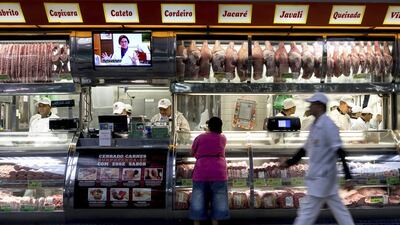The UAE has banned imported meat from six Brazilian companies amid a corruption investigation into the South American country’s livestock industry.
The head of animal health at the Emirates’ Ministry of Climate Change and the Environment, Kaltham Ali Kiaf, had said earlier on Thursday that imports would continue.
The ministry said on Thursday night that it had taken “precautionary measures”, halting the imports from the companies and instructing sellers to withdraw the products from UAE markets. The list of companies export products including frozen beef and poultry, some frozen vegetables, honey and frozen fish.
The ministry urged the public not to buy or consume products with certain ID numbers, which it has published in a circular.
The announcement follows an investigation by Brazil into its meatpacking industry. Police have accused more than 100 people, mostly health inspectors, of taking bribes for allowing the sale of rotten meat products, falsifying export documents or failing to inspect meatpacking plants.
In recent days Saudi Arabia, Hong Kong, Japan, Canada, Mexico, Switzerland China, the European Union, South Korea and Chile have announced partial or all-out bans on Brazilian meat imports.
In a statement to Aletihad, the Arabic-language sister paper of The National, Mr Ali Kiaf said the food safety department at the ministry was following the procedures to ensure the safety of food exported into the UAE.
If the ministry receives any reports from the World Organisation for Animal Health about the registration of highly virulent animal diseases in Brazil, it will immediately take the decision to ban the importation of meat from Brazil, he had said.
Also on Thursday, major fast-food chains in South Korea and Hong Kong pulled chicken, beef and pork off their menus as they scrambled to reassure customers about food safety as the scandal crisis intensified.
The drastic steps by Burger King and Mom’s Touch in South Korea and Hong Kong’s top fast-food chain Cafe de Coral are aimed at avoiding a customer backlash.
“It’s dealing a blow to small-and-medium-sized companies like us. It felt like we might be stigmatised if we didn’t follow the suit,” said the Mom’s Touch spokesman Heo Jun-gyu.
China and Hong Kong are the top two importers of Brazilian meats, last year buying nearly one-third of the US$14 billion worth of meat that the Latin America’s largest economy exported.
The Mom’s Touch chain uses chicken from Brazil’s BRF, the world’s largest poultry exporter, and meat from Brazil’s third-largest processor Aurora.
Burger King Korea stopped selling its Crunch Chicken, which uses both domestic and Brazilian meat, due to consumer fears, a company spokeswoman said. “We are not sure for the moment when we will start selling it again and whether we will replace it with a new menu,” she said.
In Hong Kong, Cafe de Coral wiped some of its top-selling items off its menu, to reassure customers. It did not say if it uses Brazilian meat.
China has urged Brazil to hand out harsh punishments to those involved in the tainted meat scandal, but offered no time frame for lifting a ban on imports from the South American country.
Top Chinese retailers in the country removed Brazilian beef and poultry from their shelves.
The issue is particularly sensitive for Beijing as it tries to improve a poor record on food safety after scandals including decades-old “zombie” meat and recycled “gutter oil” for cooking.
The National reported on Wednesday how the fallout from the Brazilian meat scandal had spread to the Arabian Gulf region. Saudi Arabia called for checks of Brazilian meat imports and today the kingdom's food and drug authority stopped imports from four plants operated by BRF, Seara, JJZ and Frango DM, the Saudi Press Agency reported. Consumers were advised to avoid or get rid of products from those plants.
chnelson@thenational.ae
* with Agencies

